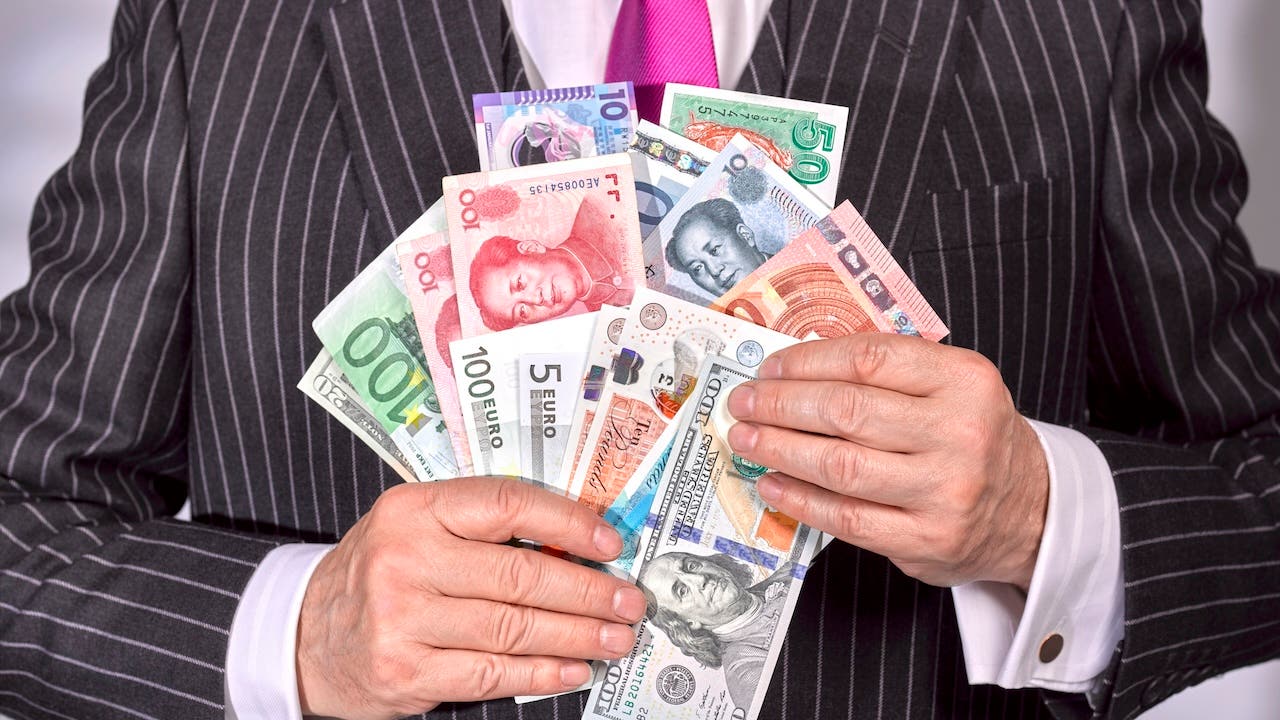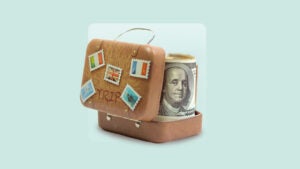Where to exchange currency without paying large fees

Currency exchange is a common necessity for travelers, international shoppers and anyone conducting business overseas. However, exchanging currency isn’t free. It usually involves an exchange rate and other fees.
Excessive fees can significantly impact how much money you receive, making it essential to know where and how to exchange currency efficiently. To effectively exchange money, you should know the fundamentals of currency exchange, fees and the best places to exchange currency for minimal costs.
The basics of currency exchange
Currency exchange is when you trade one type of currency for another to buy things internationally or pay for travel. The exchange rate varies based on several factors, including each currency’s demand, interest rates and the global economic outlook
Definitions in currency exchange
- Exchange rate
-
The exchange rate is the value of one currency relative to another. For instance, if the exchange rate for the U.S. dollar (USD) to the euro (EUR) is 0.92, $1 is worth €1.10.
- Spread
-
The spread is the difference between the buy rate (the rate at which institutions will sell currency to you) and the sell rate (the rate at which institutions will buy currency from you). Banks and exchange providers apply this spread to generate profit. Understanding the spread can help you identify whether you’re getting a fair rate or being charged excessively.
- Market factors
-
Inflation, interest rates and geopolitical events influence exchange rates. For example, if the U.S. raises its interest rates, the dollar might strengthen, resulting in a lower spread when exchanging dollars for foreign currency.
Knowing how these elements affect exchange rates is crucial in making strategic currency decisions and avoiding hidden costs.
Common fees for exchanging currency
Currency exchange is rarely free, and providers often apply fees on top of the spread. Here’s an overview of the most common fees you might encounter when exchanging currency:
- Commission fees: Many currency exchange services charge a commission fee. Fees are generally either a percentage of the transaction or a flat rate. Banks, for example, may charge a 1–3 percent commission on foreign currency exchanges.
- Service fees: Some providers add service fees covering handling and administrative costs. These are common in airport exchange booths and tourist-heavy locations, where convenience drives up the price.
- Foreign transaction fees: If you’re withdrawing currency from a foreign ATM or making purchases with a credit card abroad, be aware of foreign transaction fees, typically around 1–3 percent. You can avoid these fees by using certain credit cards.
- Minimum fees for small transactions: Certain providers impose minimum fees, which can disproportionately affect those exchanging small amounts of currency.
- Conversion fees: When exchanging non-local currency for another foreign currency (e.g., exchanging USD for EUR in a non-EU country), fees can often be higher due to double conversion charges.
These fees add up quickly. It helps to know what to expect in advance and can help you avoid paying more than necessary.
Best places to exchange currency at home
Exchanging currency at home often allows you to avoid many higher fees associated with foreign exchange abroad. Here are the best places to consider exchanging money close to you.
Your bank or credit union
Banks and credit unions are often the best places to exchange currency before a trip, especially if you’re an account holder. Major banks typically offer currency exchange services at lower fees than currency exchange kiosks, and some banks may even waive fees for premium account holders.
To make this process as simple as possible:
- Avoid high minimums: Some banks have minimum exchange amounts for foreign currencies. Contact your bank in advance to confirm requirements, especially if you only need a small amount.
- Check the rates: Major banks often post their exchange rates online, allowing you to compare rates with other options. This can help you decide if your bank offers the best money exchange rates for the currency you need.
- Place orders in advance: Banks may not carry every foreign currency in all branches, so ordering in advance ensures you get the currency you need.
Online currency exchange services
With the rise of fintech, online currency exchange services have gained popularity for offering competitive rates with low fees. Online platforms like Wise (formerly TransferWise), OFX and Revolut often provide better rates than banks or airport kiosks. You may also be able to use the convenience of a money exchange app when you’re on the go. Here’s what makes online services appealing:
- Lower fees: These platforms often have lower or no fees, as they often don’t have the physical costs associated with brick-and-mortar exchanges.
- Rate transparency: Online services provide real-time rates and often show a comparison with bank rates, making it easy to see your savings.
- User-friendly: The process is simple and often faster than going to a physical location.
Currency exchange offices in major cities
Currency exchange offices in urban centers — particularly in financial hubs like New York City, Chicago or Los Angeles — often provide better rates than airport or tourist-focused exchange services. Search terms like “exchange money NYC” or “foreign money exchange near me” to locate reputable providers in your area.
If you live in an area with this option, take some precautions:
- Avoid tourist areas: Tourist areas tend to have higher fees, so look for exchanges in less tourist-heavy locales.
- Research online: Read reviews to find providers with the best reputation and lowest fees.
Order foreign currency for pickup
Certain banks and services, including those found online, allow you to order currency ahead of time for local pickup. This can be a convenient and affordable option if you’re not rushing to get the currency.
Best places to exchange currency when traveling
Sometimes you have to exchange currency abroad. Here are the best places to do so while keeping costs low.
ATM withdrawals
ATMs can offer competitive exchange rates since they often align with interbank rates (the rates banks use to trade currency with each other).
However, withdrawing cash from ATMs abroad has some caveats:
- Use low-fee or no-fee cards: Cards like those from Charles Schwab, which reimburses ATM fees, or certain Capital One cards with no foreign transaction fees, are great options for frequent travelers. Some cards even allow you to avoid ATM fees.
- Use ATMs affiliated with major banks: ATMs connected to reputable international banks are more likely to offer favorable exchange rates and lower fees.
Foreign bank branches
In some countries, foreign branches of major banks provide currency exchange services directly to consumers. For instance, if you bank with HSBC or Citibank, you might be able to exchange currency at a branch overseas.
Before exchanging currency this way, ask about the fees to see if this is the cheapest option.
Currency exchange booths in local markets
In certain countries, especially those with a large tourism sector, currency exchange booths are available in local markets and shopping areas. While these may not always offer the best rates, you can compare the rates between several booths to get the best possible deal.
- Avoid exchange booths at airports and tourist destinations: Conducting money exchanges at the airport usually brings less favorable rates due to convenience and captive demand.
- Research local customs: In some countries, it’s acceptable to negotiate rates at currency exchange kiosks, while prices are fixed in other places.
Hotel exchanges
Some hotels provide currency exchange services for guests, though typically at higher rates. This can be an option if you’re in a pinch, but a bank or ATM is generally more cost-effective.
Additional tips to minimize currency exchange costs
Aside from choosing the best location for currency exchange, here are a few additional strategies for getting the best rates:
1. Check rates and fees in advance
When planning your currency exchange, researching rates and fees in advance helps you understand the approximate amount you’ll receive. This information also allows you to avoid surprises and prepare for higher fees if you can’t avoid them.
2. Avoid dynamic currency conversion (DCC)
When traveling abroad, some merchants offer to charge your credit card in your home currency through dynamic currency conversion (DCC). While it might seem convenient, this service often results in worse exchange rates and added fees, so always let them charge you in the local currency.
3. Monitor currency trends for large transfers
If you need to exchange a substantial amount, monitoring currency trends or using services that lock in rates can save you money. Some services, such as OFX or Xe, provide tools to lock in favorable rates for future exchanges.
4. Use currency cards for spending
Prepaid currency cards, such as those offered by Revolut, can help travelers avoid foreign transaction fees and get better rates. These cards allow you to preload currency at locked rates, which can be beneficial if you expect rates to worsen.
5. Opt for local payment methods when possible
In some countries, local payment apps may offer a more favorable rate than international exchanges. For example, in Asia, apps like Alipay or GrabPay allow for seamless payments and competitive rates when connected to foreign cards.
The bottom line
If you want to avoid large currency exchange fees, it’s important to know your options for exchanging money ahead of time. You can minimize costs and avoid the worst fees by considering banks, online exchange services, and low-fee ATMs.
Do your research and plan ahead to exchange money. Know how you’ll get the money, avoid high-fee locations like airport kiosks, and monitor currency trends for the best results. With the right approach, you can make the most of your funds, no matter where you’re headed.
Why we ask for feedback Your feedback helps us improve our content and services. It takes less than a minute to complete.
Your responses are anonymous and will only be used for improving our website.






